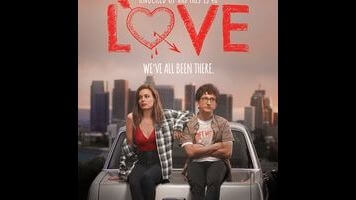Judd Apatow, Lesley Arfin, and Paul Rust set such a deliberate pace for their new romantic comedy, Love, the two leads don’t even meet cute until the final scene of the 40-minute premiere. To put that in perspective: Cue up Love at the same time another Netflix customer is starting Roman Holiday, and Gus (Rust) will be bailing Mickey (Gillian Jacobs) out of a convenience-store bind while Joe Bradley is already promising his editor an exclusive interview with Princess Ann. In a more contemporary version of this exercise, it only takes three minutes of Bridget Jones’s Diary for the heroine to reconnect with Mark Darcy and mentally object to his reindeer jumper. At the same point in Love, there are multiple zip codes (and at least two other people) separating Gus and Mickey.
It’s all part of the plan: The creators set out to capture an honest picture of courtship, dating, and sex, and nowhere is that more apparent than in how Love progresses. The first episode doesn’t rush to get Rust and Jacobs together in the same room; the rest of the season takes its time in getting the characters together, period. Eventually, there are breakups and hook-ups and make-ups here, bad dates chronicled practically in real time (to maximum comedic effect), and sex (mostly bad, some good) depicted in frank, unaffected fashion. But the show is just as interested in the moments that get cut out of the typical rom-com montage, scenes spent with the individual Love-birds and their respective gaggles of L.A.-area associates. It’s a perfect vessel for one of big-screen comedy’s most creative meanderers.
Gus is an on-set tutor with writerly ambitions, educating the easily distracted school-age stars of the fictional supernatural period piece Witchita. Mickey is working on overcoming a wild past, but the work she gets paid for involves program management for satellite radio. Their paths cross at a pair of personal low points: While Mickey pops an Ambien, meets her ex (Kyle Kinane) at what she assumes is a club (but is actually a new-age church), and loses her wallet, Gus is busy talking himself out of his first sexual encounter since splitting with his long-term girlfriend. There’s an instant, bantering spark and a long fuse, winding through missed connections, emotional baggage, mistaken matchmaking, and hurtful indiscretions. The leads keep the fuse lit, Jacobs employing the intensity, vulnerability, and crack comedic timing that made her a Community standout, and Rust finding his character in one of the sharpest representations of Midwestern Nice ever seen on TV.
A fan favorite on the TV and podcast versions of Comedy Bang! Bang!, Rust delivers the performance of his career in Love. Like Review star and fellow CBB fixture Andy Daly, he has a knack for playing characters whose outward harmlessness masks some serious damage, and some of the funniest scenes in Love find Rust straining to maintain the nice-guy façade as his inner prick claws its way to the surface. And yet there’s a relatable humanity to that struggle, which makes him an ideal onscreen match with Jacobs, who gracefully pares down Mickey’s defenses as the people around her make her aware of her own bullshit. Foremost in that role is her roommate, Bertie (Claudia O’Doherty), who’s less of a sidekick and confidante to Mickey than a weird, winsome presence worthy of her own spinoff. One noted advantage of Love’s relaxed pace is the screentime it affords its supporting players—particularly, O’Doherty, who pulls out unexpected punchline after unexpected punchline on her way to a love story of her own.
Love is a late-breaking ripple in the rom-com wave that brought You’re The Worst, Selfie, Marry Me, A To Z, and Manhattan Love Story to primetime in recent years. Only You’re The Worst survived to a second season (with a third on the way), something Netflix promised to Love from the start. As the new show glides through its everyday L.A., it’s not hard to picture Jimmy and Gretchen and Gus and Mickey fighting hangovers on the same brunch patio—or the four of them winding up on the receiving end of half-envious, half-nostalgic glowering from the core quartet of Togetherness, who are simultaneously being judged by a flock of Pfeffermans. With so many worthy programs currently covering similar thematic and geographic ground, it’s exciting to watch Love stake out a space where other shows can’t go (like the members-or-invite-only Magic Castle), or drafting from dynamics and energies that are unique to it (like the UCB and Earwolf all-stars that regularly congregate at Gus’ apartment to improvise theme songs for movies that don’t have them). Arfin, Apatow, and Jacobs previously worked together on Girls, so there’s a little bit of residual New York anxiety to their work here—though that calls to mind passages of another Netflix series, Master Of None, particularly when an early episode pegs its dramatic arc to an unreturned text.
But this show and that show only really share a streaming home and a flair for crafting individual episodes that stand on their own while contributing to a larger whole. Love’s slow-and-steady approach is a lot to take in binge-viewing chunks, but there are several installments of the first season that succeed despite (and because) of their shagginess: a house-warming party where Mickey is haunted by ghosts of boyfriends past, a date driven intentionally off the rails, a journey into the L.A. subway system with tour guide Andy Dick. No matter how it’s watched, Love communicates the honesty its creators strived for, if only for the believable way it draws Gus and Mickey together across time, space, and their own insecurities. Put in the time with Love, and that time will be rewarded.
Binge-watch reviews by Shelby Fero will run Friday, February 19 through Sunday, February 21. For readers watching the show at a more moderate pace, reviews by Molly Eichel will run daily from Monday, February 22, through Wednesday, March 2.

 Keep scrolling for more great stories.
Keep scrolling for more great stories.
